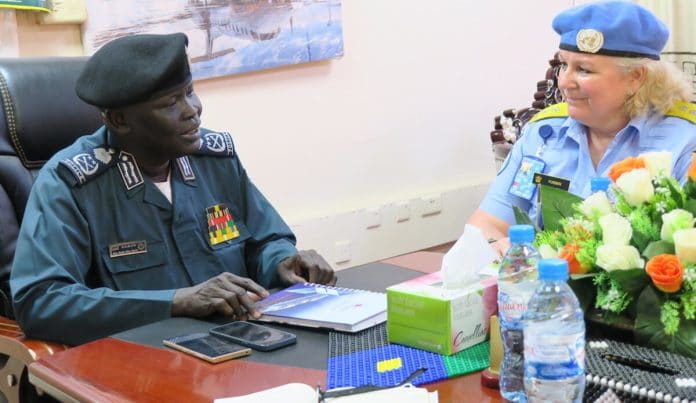And so she did. Meet Christine Fossen, the new Police Commissioner of the United Nations Mission in South Sudan, who didn’t hesitate to leave her Arctic Norwegian origin behind for a first and exciting challenge in Africa.
“I’ve always been tempted by working abroad and with the UN, and during the last two years I’ve been involved with Norway’s work at the UN Security Council. When this position appeared I thought that maybe this was my chance,” she tells Radio Miraya in an exclusive interview, adding that having her candidacy strongly backed by her government helped her deciding to up her sticks.
29 years experience

While she may never before have worked for a UN peacekeeping operation, Ms. Fossen hardly lacks police experience. In fact, she’s bagged some 29 years’ worth of it, with more than twenty of them being accumulated as the equivalent of a UN Police Commissioner within the Norwegian police force.
“I actually graduated as a lawyer. In our system, law graduates can join the police, so I became a prosecutor for several years, taking criminal cases to court and overviewing investigations,” she explains.
Christine Fossen, despite having been Deputy Police Commissioner in the far north of her country, close to the Russian border, has never experienced frostbitten feet as a police officer “on the beat”. That’s probably because she has never been a patrolling police officer, but she is confident that she can and will do a good job in South Sudan, where she arrived a mere six weeks ago.
She joins the peacekeeping mission as its second consecutive female UN Police Commissioner, preceded by Fijian Unaisi Bolatolu-Vuniwaqa, in the country, with uniformed colleagues from almost 50 countries at her disposa“I’m used to having the total responsibility for a large number of policing staff. At my last post, there were between 1,600 and 1,700 of us,” the new Commissioner says. “I have also attended several international UN trainings, including the senior leader course, which exists to qualify staff for the kind of post I am now assuming.
Palestine
Christine Fossen is familiar with working in a multinational and multicultural environment: for 18 months in 2013 and 2014, she headed an observer mission in the West Bank, in the disputed city of Hebron, Palestine. There, she and colleagues from six countries documented and reported on human rights violations, a topic she believes will be key in South Sudan as well.
“Knowing how to be a professional police officer, respecting human rights and working with and for the people you are protecting is key,” she says. “It is critical that everyone is aware of the different roles and responsibilities of the police and the military respectively,” she adds, referring to the fact that many current South Sudanese police officers have a military background.
Supporting her policing colleagues in her new, adopted home country in enhancing their ability to protect civilians will be Ms. Fossen’s main task, and it will involve working closely not only with the South Sudanese police force but also with other components of the peacekeeping mission.
“Not least our Rule of Law and Human Rights teams, to maximize our joint, positive impact, for example when it comes to the issues of preventing and investigating sexual gender-based violence, and also how to make sure that survivors of such violence are taken good care of and are safe,” the Police Commissioner comments.
Looking a bit further ahead, Ms. Fossen anticipates another huge task that will face the national law enforcement agencies: general elections.
“We already have continuous discussions with the leadership of the South Sudanese police on how to work together to provide security during the free and democratic elections scheduled to take place. It is vital that people feel safe to use their votes when that time comes,” she remarks.
International standards for policing
Having oil may be one of few similarities between Norway and South Sudan – marauding thieves of unattended snowmobiles are after all unheard of in the latter country – but the incoming Police Commissioner is a firm believer in common, international standards for policing. One example is female representation in the law enforcement force.
“Over the last few years, I have seen in Norway and in very many other countries how female police officers are taking on all kinds of roles at all levels. Women police officers need to believe in themselves, step up and support and stand up for each other. I believe that the national police leadership is aware of the advantages of having many female officers,” she says.
Almost a professional lifetime’s worth of policing experience has taught Christine Fossen, whose Norwegian colleagues typically go about their work unarmed, that there is another key and universal element behind all successful law-enforcement activities: trust.
“A police officer should be strict when it’s necessary, but in most situations, there is no need for that. Most problems can be prevented or solved by just talking to people, in a friendly way. That, and staying away from corruption, is how you build trust, and that is essential. If people here trust their police, they will step forward, cooperate, and assist in preventing crime from happening,” she affirms.
For now, the peacekeeping mission’s Police Commissioner asks all South Sudanese citizens to trust her professionalism and dedication to assist their national police force as best she can.
*This article is based on a Radio Miraya interview conducted by William Sebit. See here.




